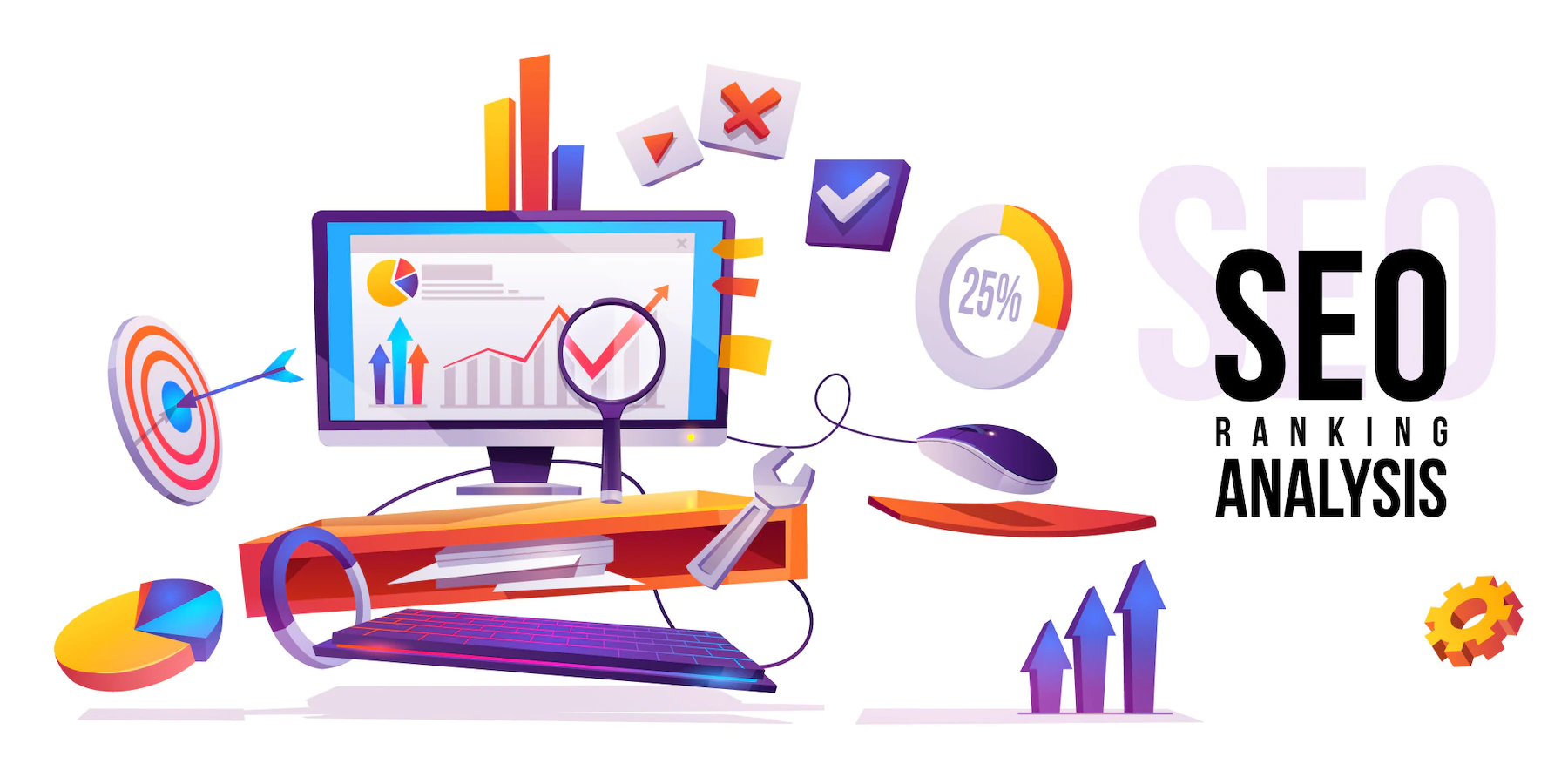Google
Google has the largest market share of any search engine, so optimizing your business website for Google first makes sense. Fortunately, optimizing for Google helps optimize for other search engines. However, we will dive deeper into the subtle differences and benefits of other search engines ahead.
For now, here's what you need to do to improve your SEO for Google so you can rank higher on their SERP.
Improve Your Webpage Load Speed
How fast your website loads can have a huge impact on your rank. Firstly, Google can tell if your website loading time is slow, which it does not prefer. Hence, it ranks your website lower. Secondly, a slow-loading webpage results in a bad experience for online visitors or users.
It increases the chance of visitors abandoning your website for a competitor's website. This occurrence can be measured using the bounce rate metric. Bounce rate is the percentage of visitors that leave your website after the first page. Higher bounce rates also negatively impact your ranking.
If your website is taking more than 3 seconds to load, there is a high chance that you are losing most of your visitors after the first page, which increases your bounce rate. What's worse is that around 80 percent of these visitors may never return to your website.
On the other hand, faster load speeds can improve your SEO ranking and result in more repeat visitors who do not bounce. Google will recognize this and bring your rank higher on SERPs accordingly. You can improve your load speeds by opting for a web hosting provider that offers faster servers.
Faster server response results in faster loading speeds, whereas you can also optimize your website to load faster by ensuring you use efficient plugins and themes.
High-Quality Dynamic Content
All marketers understand the importance of content, especially when it comes to digital marketing. Updating your website with new, high-quality content keeps things fresh, which gives visitors a reason to come back for more.
Your website will rank higher on Google if your content is recent, relevant, and high-quality. Dwell-time, or the amount of time a visitor spends on your website, is also a factor to consider for SEO ranking. So, your content needs to be compelling, engaging, and informative enough to hold visitors for longer.
Quality images are a great way to make your website attractive to online audiences. However, you need to optimize images in your content to improve SEO ranking. An optimized image in the size and format that’s ideal for being displayed in web browsers and can be opened without issues across devices and internet speeds.
While huge, high-quality images may look great, they can slow your website's load speeds. So, you need to compress and resize your images to make sure you aren't hurting your load speeds or rank.
Similarly, you may use keywords in the meta details of your images like the titles, descriptions, or captions to improve SEO. However, Google may no longer consider these as ranking factors, but they may help you with other search engines like Bing and Yahoo.
- Content Breakup Using Headers
Header tags help break up your content into smaller, more relevant bits. This makes your content more attractive, easy to read, and improves the user experience, which helps improve SEO ranking. It can quickly direct readers to the relevant bits and encourage them to spend more time on your website.
- Create Quality Blog Content
Blogging is a great SEO strategy to rank higher on Google and other search engines. It helps you engage relevant audiences, build trust, generate leads, and build your domain authority (DA). These are all great for business and SEO rankings.
Regular, high-quality, relevant blogging is a great way to attract the right audiences and encourage them to spend more time on your website. Once you establish a fan base of loyal readers, you can expect regular visits from them.
You can include headers, keywords, optimized images, videos, audios, and quality links in your blogs, all of which are excellent SEO efforts to improve ranking.
You need to note that the average blog content length of the top results on SERP is over 2,300 words. So, while quality short-form content (500-100 words) can still help improve SEO ranking, long-form content is more likely to get you in the top 3 spots of the SERP.
- Readable, Relevant, and Informative Content
Good content is always easy to read, relevant, relatable, and informative. If you cover complex and technical topics, ensure that your content is easy to read and understand. This will give you the best chance at capturing the majority of online traffic and, therefore, larger audiences.
At the same time, your content needs to be informative and solve problems for your readers. The better you can resolve pain points for your readers, the more trust you can build, which will keep them coming back for more.
Similarly, it is important to revisit your content every year and review the information, keywords, links, and format. This keeps it up-to-date and relevant, making it evergreen content. Update ideas and determine if you need to add more. Google will recognize this and rank you accordingly.
Hyperlinks
Quality links are a great way to show Google, other search engines, and audiences the credibility of your content and claims. Most importantly, increasing the credibility of your website shows Google that your website is trustworthy, therefore increasing its SEO rank.
- Use Quality Outbound Links
You can start by making sure all the claims and data on your website and content are backed by linked sources from trustworthy and authoritative websites.
Similarly, you can use internal linking to increase visitor dwell time and SEO ranking. So, add hyperlinks to your content that link to other website pages. Of course, the links need to be relevant and recent.
Adding internal links ensures visitors who consume your content continue to other pages on your website to consume more content.
- Inbound Links (Backlinks) from Quality Websites
When other quality websites link their content to pages on your website, it helps improve your SEO and search engine ranking. This is because of two reasons. Firstly, it drives more traffic to your website from the inbound link of another website.
Secondly, Google understands that you are gaining authority in your field, which improves your credibility and subsequently, your SEO ranking. However, you must ensure that only quality and trustworthy websites backlink to your pages, as the opposite may adversely affect your ranking.
There are plenty of tools like link explorers and backlink checkers online that can help you source inbound links and check if they are from trustworthy or quality websites. Google suggests that you ask the website owner to remove the link before reporting it to Google's disavow tool for removal.
- Share Links on Social Media
Your business needs social media accounts to compete in the modern digital era, so social media marketing should be a part of your digital marketing strategy. Moreover, you can use your social media accounts to link your website and relevant pages.
Adding social media links help increase traffic, especially when people share your links on social media. Increased sharing and traffic help you rank higher on Google and other search engines. Apart from sharing links on your social media pages, you should include your socials and their sharing icons in your content.
This encourages online traffic to flow both ways, from your website to your social media accounts and vice versa.
- Address Broken/Dead Links
While this does not normally happen with links to quality and trustworthy websites, it is still possible that your links break or die. If your visitors click an outbound or internal link and it leads to a broken page, your visitors will have a poor user experience and also lose trust.
Regularly check your internal and outbound links, so broken/ dead links do not hurt your SEO ranking. Alternatively, you can use free online tools for the same task.
Mobile Optimization
A vast majority of online traffic comes from mobile devices. There is a 60 percent chance that you are currently reading this content on a mobile device. This makes it an important requirement for your website to be accessible, optimized, and seamless for mobile users.
It can help improve your SEO ranking on Google SERP dramatically. There are many ways to optimize your website for mobile users, like redesigning pop-ups and enabling Accelerated Mobile Pages (AMP), but the best is to create a mobile app.
This may seem like an expensive option, but you should look at it as an investment. A mobile app helps improve ranking because of Google's Mobile-First Index, which ranks search results based on the mobile version of your page.
If you are unsure about the mobile-friendliness or optimization of your website, you can quickly check it through Google's free mobile-friendly test. You can also use it to check the mobile optimization of your competitors' websites.
Register Your Business with Google
Registering with Google Business lets Google know what your business is, where it is, and what type of audiences can benefit from it. This option is great for brick-and-mortar businesses that want users to find their business location.
Registering your business with Google Business is a local SEO tactic that allows nearby local users to easily find your business address on Google. Just make sure to include your business information, high-quality images, and verify your contact information. It can help increase your rank on Google, but most importantly, it will help nearby users find your business.
Other Search Engines
Apart from Google, your main focus should be to rank higher on Bing and Yahoo search engines. These are the two biggest ones after Google, with Bing having over 7 percent global market share and Yahoo having nearly 3 percent.
While you may think this is nothing compared to the tech giant Google, a 7 percent market share means millions of potential customers. Notably, most businesses and marketers only target Google, which means that optimizing your website to rank higher on a search engine like Bing can give you a competitive edge.
Moreover, Cortana users, older adults, non-tech-savvy users, users in remote or rural areas, and Yahoo mail users mostly turn to Bing or Yahoo for online searches. If these demographics suit your business, it is well worth making an effort to rank higher on these search engines.
Differences Between Search Engine Algorithms
Ranking is slightly different for each search engine because of their unique algorithms that rank websites for SERPs. Generally, Google has the most advanced algorithm, whereas Bing and Yahoo are understandably behind.
While Google relies heavily on text and context for ranking, Bing and Yahoo rely more on visuals and direct keywords. Moreover, Bing is more open about its ranking factors, which means less effort for reaping the rewards.
Unlike the others, Bing considers domain age (how old your website domain is) as a factor for ranking. It also promotes local SEO and searches more than the others, making it a great option for small, brick-and-mortar businesses.
Regardless of the difference in algorithms, most SEO techniques and ranking efforts for Google, Bing, and Yahoo are similar. These methods include the ones mentioned previously with slight differences.
So, how do you rank higher on other search engines?
On-Page SEO
Unlike Google, Bing and Yahoo rely on older ranking factors, including these on-page SEO elements.
If your domain (URL) matches exactly with a query, ranking higher is a key factor. You shouldn't go out of your way to buy a matching domain, but if your domain matches a keyword, it is a bonus for your SEO ranking on Bing and Yahoo.
While Google relies on context and other things, Bing and Yahoo match exact keywords for results on the SERP. This means you should practice using exact keywords for content, especially headers. Just remember to use them naturally.
Similarly, you can use keywords in the meta details, another ranking factor Google does not rely on anymore.
As with any search engine, the relevancy and quality of your content matter Alternate search engines like Bing rely on three key things.
-
- Authority
- Utility
- Presentation
This means your content must mention sources and the author, address the query to help users, and present content in a way that makes it distinct from advertisements. Of course, your content needs to be attractive, useful, and relevant.
Moreover, Bing and Yahoo like media content more than Google, which means you have a better chance to rank higher on Bing and Yahoo if you add images and videos to your content.
Quality Over Quantity for Links
Bing heavily favors quality links over the number of links, which means even a few quality inbound links can help your website rank higher on Bing. Organic backlinks from trusted websites, especially those with the .gov, .edu, and .org domains, are ideal.
Moreover, if the links come from older domains, Bing will rank you higher since it trusts older domains more than newer ones. Remember to check broken/dead links regularly and disavow spammy links at all costs, as it can hurt your ranking on Bing more than on Google.
Social Media Sharing
Social media influences your Bing ranking more than your Google ranking. Bing actively uses the number of social media shares to understand the popularity of your pages. The more social media shares your page gets, the higher you rank on Bing SERP.
Register with Bing Places
Bing most likely already has your business in their directory, but you have to claim it to reap the benefits and rank higher. You can optimize your business listing on Bing Places and get a few reviews to place your business higher on local search results instantly. Just make sure you give the correct details and contact information; verify before you publish.
Use Bing Webmaster Tools to Improve SEO
If you want to make the most of Bing, you need to start Bing Webmaster Tools. You get a comprehensive suite of diagnostic tools, an intuitive dashboard, link monitoring, keyword research, etc. You will better understand how Bing views your website and what you can do to rank higher on Bing.
Optimize for All Three
When it comes to ranking higher on SERPs, your main focus should be Google, and you should aim to optimize your business website and content accordingly. Search engine optimization for Google also helps improve optimization for other search engines, including Bing and Yahoo.
However, the things mentioned above highlight the key differences impacting SEO rankings on the three search engines. It is also entirely possible to optimize your content for all three. The best approach for optimizing your content is to provide useful, informative, and high-quality content for online users.
Search engine algorithms aim to improve user experience, and optimization achieves its objectives by focusing on user experience. The best way to improve user experience is to provide good content users want to engage with and revisit.
Of course, you still need things like fast load speeds, mobile optimization, quality links, and more to improve the experience, which is why you must practice the best SEO efforts, including the mentioned ones. However, by doing simple things like including a lot of visuals throughout, your content can also improve your website’s ranking on Bing and Yahoo.
It also helps makes your content more appealing to visitors. Similarly, including direct keywords for Bing and Yahoo and indirect, context-based keywords for Google will help cover all your bases. Remember to avoid keyword stuffing, as it hurts SEO efforts and ranking for all search engines.






